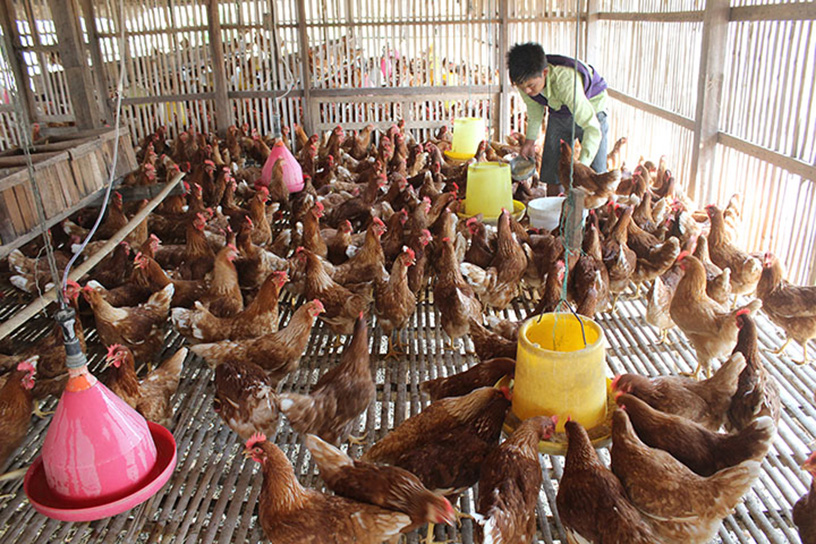The longer COVID stretches on the more it affects livestock breeding businesses and make it hard for SMEs in that industry to recuperate. The Livestock Breeding and Veterinary Department is increasing its efforts in livestock breeding, production and employment opportunities.
The Livestock Breeding & Veterinary Department is working hard to circumvent challenges to livestock breeding that have popped up during the spread of the coronavirus, COVID-19. A survey conducted by the Livestock Breeding & Veterinary Department earlier in April this year reports that 40 per cent of livestock breeding businesses were negatively affected by the spread of COVID-19. Small and medium enterprises are especially affected by the inability to deliver their products to customers on time, products going bad in prolonged storage due to travel restrictions, and the decline in meat product prices.
“Product flow considerably slowed down during COVID-19 and our department is doing all it can to revive livestock breeding businesses, veterinary disease prevention, stabilizing the market, and ensuring efficient product flow,” explained Dr Ye Tun Win, Director-General of the Livestock Breeding and Veterinary Department. The Director-General said livestock breeding is an important livelihood for people in rural areas. He said it also brings in foreign revenue as the oxen, cattle, sheep and goat livestock are imported to neighbouring countries.
Special action plans
The Livestock Breeding and Veterinary is attempting to curb the spread of veterinary diseases during COVID-19 as it could further slow down the industry. They are administering foot-and-mouth disease vaccination, antibiotic treatment for diarrhea in pigs, and treating wry necks in chickens. The procedure is implemented in densely populated areas that have the highest rate of positive COVID-19 patients in locations near the Ayeyawady Region that are linked to Yangon Region, and in Bago Region. The European Union has provided EURO 2 million in assistance for administering the medicine.
While it is difficult for staff to go into the field to administer vaccines and medicine during COVID, they receive assistance from veterinary staff in villages across the states and regions to protect residents from losses from veterinary diseases. The Ministry of Agriculture, Livestock and Irrigation has set policies to establish cold storage warehouses and coordinating with relevant organizations and experts from the World Bank.
“Livestock products such as meat, eggs and milk are easily perishable so when the travel restrictions were enforced, they could not be sent to the market on time and were lost,” explained the Director-General. “Livestock breeding SMEs were hit the hardest so a loan of US$ 4 million from the World Bank was acquired to implement cold chain storage Yangon, Bago and Ayeyawady regions under a joint-venture system with private sector businesses.”
Engaging in discussions
The Myanmar Livestock Federation engages in regular online meetings with livestock breeders to ensure the continued production of chicken eggs and meat, the staple protein sources of Myanmar, and keep the market prices stable. The federation managed to acquire data that prevented chicken farms and egg farms from overproducing from the market demand and speculate prices. The federation also coordinates between local and foreign businesses to ensure production remains compliant with the market.
The longer COVID stretches on the more it affects livestock breeding businesses and make it hard for SMEs in that industry to recuperate. The Livestock Breeding and Veterinary Department is increasing its efforts in livestock breeding, production and employment opportunities.
The Director-General said they are working closely with people working in or starting up livestock breeding businesses in 109 townships to implement artificial insemination of livestock, medical care for them, and training courses for breeding and rearing cattle, pigs, poultry, sheep and goats.
He said these processes will aid in recovering livestock breeding and production and creating jobs once restrictions in place are removed or lessened. He said they will implement the Cash for Work project of the COVID-19 Economic Relief Plan (CERP) to generate income for local residents and will utilize K1440 million from the Union Government to implement it.
Support funds & loans
The Livestock Breeding and Veterinary Department is also contributing to the Village Capital Raising Fund Project that the Rural Development Department will implement in 1,700 villages so that small-scale farmers and breeders can prepare for the monsoon farming season. These farmers are currently not receiving regular income due to low sales.
The World Bank loan of US$ 2 million will be used to treat foot-and-mouth disease in cattle in 50 townships, as part of setting up disease containment zones, so that cattle border exports can resume and thrive after COVID-19. (Translated by Pen Dali)


